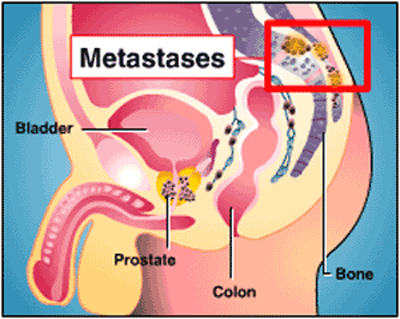Dr. Ajay Anand
Prostate cancer is an androgen dependant disease. It is diagnosed by raised serum PSA in most of cases coupled with tissue diagnosis on prostatebiopsy.
Basic aim in treatment of metastaic prostate cancer is to ablate source of androgen to achieve castrate levels of serum testosterone. Main source of androgen is testis in males, with a small contribution from adrenals.
Ideal procedure to ablate androgen is bilateral orchidectomy (surgical removal of testis) also known as surgical castration. Some patients who are not willing for surgical castration can be advised medical castration in form of LHRH analogues. Medical castration needs frequent administration of these injections at one, three or nine months depending upon the strength of depot injection of LHRH analogue used. Surgical castration that is bilateral orchidectomy is a preferred, less expensive and one time procedure to achieve castration.
Addittionally we need to prescribe antiandrogens to take care of ather souces of androgenslike adrenal glands. This is what we call as complete androgen blockade. Aim is to achieve castrate levels of serum testosterone, which drastically slows down progression of disease.
Such patients need to be followed up with every three monthly serum PSA levels to titrate dose of antiandrogens/adding second line drugs as fosfestrol (Honvan) or ketoconazole; orinitiating chemotherapy in cases with persistent rise of serum PSA.
The last 5 years have seen dramatic advances in the treatment of prostate cancer with 5 new drugs being approved. What is particularly exciting about these 5 drugs is that they each have a different way of attacking the cancer.
* Abiraterone (Zytiga) reduces the production of testosterone
* Enzalutamide (Xtandi) block testosterone from interacting with the cancer cell
* Sipuleucel-T (Provenge) activates the immune system to attack prostate cancer
* Radium-223 (Xofigo) delivers radiation directly to the bones, thus attacking prostate cancer at its most common site of metastasis
* Lastly, Cabazitaxel (Jevtana) is a new chemotherapy that works after the old standard chemotherapy of Docetaxel (Taxotere) stops working
1. Abiraterone Acetate (Zytiga) – Zytiga inhibits the production of testosterone precursors and decreases the levels of testosterone. It is usually given with prednisone. Zytiga was originally indicated in patients who had failed docetaxel (chemotherapy) but more recent studies have shown benefit in the pre-chemo patient. One study showed that the radiographic progression-free survival (rPFS) was over 16 months in the Abiraterone and prednisone group versus 8 months in the control group.1
2. Enzalutamide (Xtandi) – Formally known as MDV3100 this medication is second generation androgen-receptor blocker. It works both on the outside and inside of the cell. It was initially indicated in post-chemotherapy patients for mCRPC but studies have shown benefit in the pre-chemo patient also. The PREVAIL study showed that on average, enzalutamide delayed the need for chemotherapy by 17 months (28 vs 11). It also showed that use of this drug delayed radiographic progression by 81%.2
3. Radium 223 Dichloride (Xofigo) – Although this is an injection it is actually a type of radiation called alpha radiation. This treatment is meant to target prostate cancer cells in the bones. Bones with prostate cancer preferentially absorb Xofigo. Radium then releases the alpha radiation, which is very short range. The idea is to kill the active cancer cells with minimal damage to normal bone. This should be more targeted than strontium-89, which has been used in the past. Studies have shown increased survival in patients with mCRPC and bone metastasis.
4. Sipuleucel-T (Provenge) – Sipuleucel-T is a therapeutic cancer vaccine for prostate cancer. It is meant for asymptomatic or minimally symptomatic patients with mCRPC. It is individualized to each patient and requires blood donation. The blood is activated at the lab and then re-infused later in the week. The treatment is provided 3 times over the period of a month. It is the first FDA approved therapeutic cancer vaccine (as opposed to a preventative vaccine). Overall survival was increased by the use of Provenge in symptomatic or minimally symptomatic mCRPC patients.
Dr. Sweeney showed that using docetaxel chemotherapy with Lupron as the first treatment increased the life of patients by over 13 months when compared to lupron alone. The chemotherapy was given as an IV infusion once every 3 weeks. Patients received 6 treatments of chemotherapy over the course of 18 weeks, and then typically stayed on lupron without chemotherapy for another 2 years.
In addition, in patients who received lupron alone, the prostate cancer become resistant and started growing again after about 20 months. In the patients who received chemotherapy alongwith lupron, the cancer remained in remission for more than 32 months. This means that patients who received the 18 weeks of chemotherapy had the benefit of more than an extra year before they needed to move on to new drugs with more side effects and high costs.
The bottom line is that using an old, relatively cheap chemotherapy provided a greater benefit to patients than any of the other current options. There is a powerful argument against the idea that chemotherapy should be reserved as a last resort. In fact, the patients who started with only lupron often received chemotherapy later in their treatment course, but the benefit of late chemotherapy is less than the benefit of early chemotherapy.
While every patient is different and deserves an individualized treatment plan, doctors and patients need to keep chemotherapy in mind as an option. It is clear that chemotherapy remains a powerful tool in the fight against prostate cancer, and doctors and patients need to at least talk about chemotherapy as an option before deciding on the best treatment course.
(The author is presently serving as consultant urologist in Superspeciality Hospital, Govt. Medical College Hospital, Jammu.
Trending Now
E-Paper


